PAT PULLING
and
ROSEMARY LOYACANO
Representing the nationwide organization
-Bothered About Dungeons and Dragons, Inc. '
(B.A.D.D.. Inc.); both are mothers of teenage
boys who lost their lives as a direct result of
deep involvement in the game Dungeons and
Dragons; authorities who educate teens, parents,
school officials, lawmakers, and the police
about the dangers of fantasy role playing games
media depictions of violence, and other harmful
influences which are negative to children.
TOPIC:
'Dungeons and Dragons':
The Prototype for Understanding All Other Role
Playing Games.
The so-called game 'Dungeons and Dragons'
(referred to hereinafter as D&D) is the
prototype for all other role playing games. To
understand the others, you must understand
D&D. This game fosters a love of violence
and a love of sadism.
Pat showed a
composite of T.V. network news programs from the
U.S. and Canada dealing with D&D and deaths
attributable to involvement with it. A copy of
this tape can be obtained by contacting Fat.
sending a blank VHS tape. and providing postage.
Fantasy role playing games (hereinafter FRPGs)
employ the following brainwashing techniques:
1. Fear is a major tool; .it is contrived
through spells for magic users. These spells
require players to imagine emotions in their
mind. Various player-characters are available
which possess different attributes. Each player
must choose which character he will assume.
In order
to succeed in D&D and
similar FRPGs. players must align themselves
with negative emotions. Most players
begin in their early teens when many emotional
changes are already taking place in their lives'
when they are most vulnerable.
2. Isolation, another common brainwashing
technique, occurs as the player is removed from
normal support structures-- either physically,
by spending an inordinate amount of time playing
or preparing to play at an out-of-home location
or psychologically because he is absorbed in the
play' the characters, the other world in which
the FRPG is played
Interaction in
family and peer activities outside the realm of
D&D diminishes.
3. Physical Torture and Killing, which are
abhorrent for a well-adjusted, civilized
teenager, become a primary focus as D&D
involvement progresses. Those D&D players
who irretrievably cross the imaginary line
between reality and fantasy sometimes act out
torture and killing with deadly results.
4. Family
Values are attacked. The leader of the game the
Dungeon Master (or DM) demands total loyalty
from and control 0.
of the players. He demands allegiance. He is
The 'god' during ploy who determines life and
death, success and defeat. Whatever his personal
ethics and morals, those playing D&D must
submit or be cast out of the group.
5. Situation Ethics in the fantasy world of
J&D play. replace personal and ' societal
absolutes. Whatever can be justified in
one's own mind—contingent upon the unreal rules.
forces, and loyalties artificially put in place
in a make-believe world of play-is accepted.
There are no evil, no good, no win-win
situations. It is a survival game, without
mercy or compassion, and little consideration
for the rights or dignity of others.
6. Religion
is directly eroded by D&D play. The
restructured value and belief systems are
directly opposite to traditional
Judeo-Christian values Instead, belief in
multiple gods and deities (which are directly
attributable to ancient sorcery and mysticism)
replace God. Each D&D player is urged to
adopt a patron deity which is actually an occult
personality straight out of sorcery and
witchcraft.Defilement, excrement, and urination
are stressed in one DM's Guide passage
concerning
"...defilement of fonts..." under a
"...Cleric 's spell...
7. Loss of
Self Control is a significant danger to young pi
avers as authority is increasingly given to the
DM. This Is done voluntarily by the players, but
is not done advisedly.
8. Degradation is a common theme in D&D
play. This includes emphasis en sex. sadism,
torture, and pain. The degradation
is graphically accomplished through visual
imagery which is well into the realm of
pornography and intentional defilement
of innocence.'
Among slides
shown by Pat Pulling was a graphic, demon-filled
advertisement which appeared in BOY'S LIFE
MAGAZINE, a publication of the Boy Scouts of
America. These enticed the reader to enter the
world of D&D as a personal invitation to
adventure. D&D. created by Mr. Gary Gigax.
and produced through TSR. now grosses over $60
million per year. Spin-off games, cartoon
series, paraphernalia, and reference materials
are avidly consumed by young persons who become
one with their D&D characters. They
vicariously act out heroic actions in
surrealistic worlds of guided imagery in their
minds which are far removed from the world of
reality. There is a direct, undeniable theme of
actual occult symbolism and usage in D&D
materials and play. Page 86-7 of the Player's
Handbook shows the pentagram, the thematurgic triangle, and
magic circle, all of which are used in real
sorcery and conjuration of demons, especially
involving human sacrifices. The
'Cache-demon' described in the book requires the
tribute of fresh human blood. Demons are
summoned using these signs to attract souls.
Extract Ends:
|
|
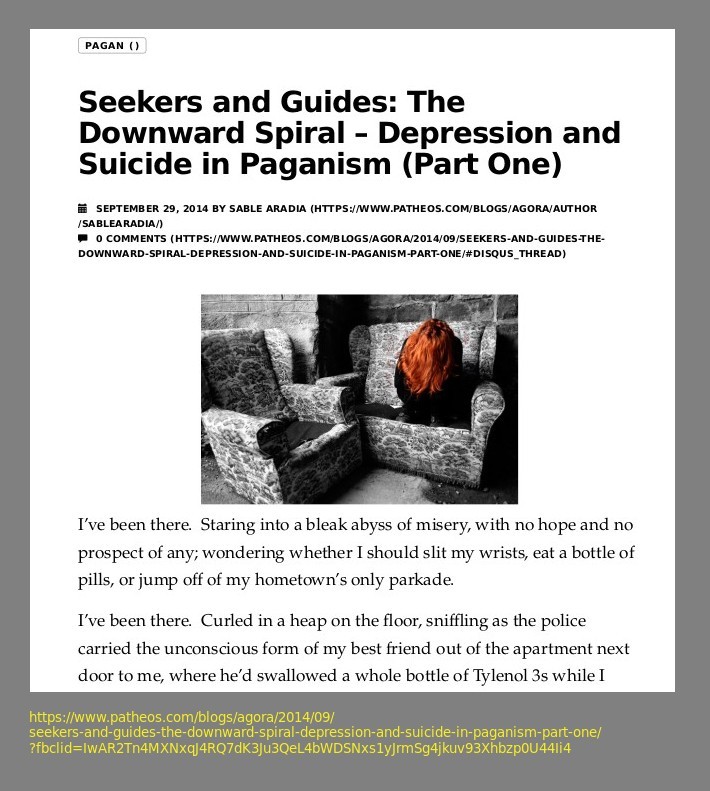 Does the religion
of Paganism encourage people to kill themselves? Does the religion
of Paganism encourage people to kill themselves?
Here's a classic example of how foolish but well-meaning
people can help destroy their own Temples and Churches by
unwisely presenting an unfact in a climate of superstition
and hysteria.
In 2003 Helen Berger and Evan Leach published 'Voices
from the Pagan Census' a supposedly insightful
socio-economic analysis of the new religion of
Neo-Paganism.
https://www.amazon.com/Voices-Pagan-Census-National-Neo-Pagans/dp/1570034885
They billed it as a first-ever and the jacket blurb offers
much. Except that it wasn't the 'first', the SAFF
published the FIRST Occult Census, a
ground-breaking work in 1989 which is still available for
download here: http://www.sorcerers-apprentice.co.uk/census.htm
Berger and Leach's 2003 book is an almost copy-cat format
in profile and scope but appears to have muted some
important differences.
In most areas the conclusions of their 2003 book concur
with the 1989 Occult Census as you might expect,
except for one crucial difference.. 'Voices
from the Pagan Census' has been held to
conclude that Neo-Pagans are more likely to commit
suicide because of their beliefs! This is a
dangerous and untrue assertion yet has been accepted
without question by some within Paganism in the U.S. in
particular Dianne Morrison who writing under the 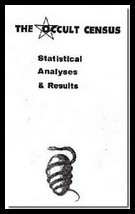 pseudonym of Sable Aradia has
written an extensive three part article in Patheos.com
offered as a 'Seeker's Guide' to alert newcomers,
titled: pseudonym of Sable Aradia has
written an extensive three part article in Patheos.com
offered as a 'Seeker's Guide' to alert newcomers,
titled:
The Downward Spiral
– Depression and Suicide in Paganism,
and goes on to flesh out the idea that Magical and
ritual involvement somehow exposes Pagan practitioners
to depression and leads to suicide!
Yet SAFF statistics
prove that Pagans are not more likely to commit
suicide than anyone else.
To back up the suicide theory Morrison quotes Berger and
Leach's book as evidence. The truth is
that not only is there is no evidence of a pro-rata
increase in suicides in Paganism but SAFF statistics show that suicides
in Pagan groups are unheard of.
In the 32 years which the SAFF has been functioning and
collecting data there has been only one incidence of
suicide related to the occult in our files and that was
the death of Nick Gargani from Lewes, a city in
Sussex, UK, in 1997. Although Gargani did have a serious
interest in the occult his suicide was motivated by other
things as the SAFF expose of the story explains
here; http://saff.nfshost.com/lewesrep.htm
General suicide rates in
Britain are so high in comparison with any known
Pagan suicides that Pagan deaths pale into
insignificance.
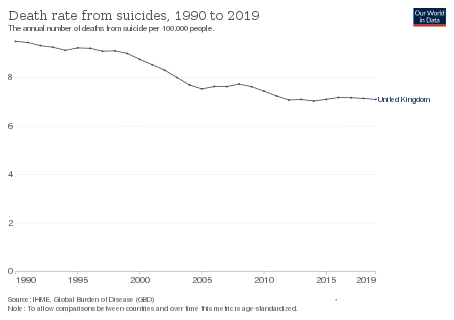 In
fact in Britain alone suicides since 1990 have reached
a quarter of a million deaths . ( The average is
around 7,000 suicides per year.) During that period
the single 'occult' suicide that SAFF recorded was
Gargani's. In other words suicides linked to
occultism/paganism are insignificant when compared with
suicides of people who are nominally Christian or Moslem
or from any of the other faiths. In
fact in Britain alone suicides since 1990 have reached
a quarter of a million deaths . ( The average is
around 7,000 suicides per year.) During that period
the single 'occult' suicide that SAFF recorded was
Gargani's. In other words suicides linked to
occultism/paganism are insignificant when compared with
suicides of people who are nominally Christian or Moslem
or from any of the other faiths.
Indeed this is now a scientific fact because in
2021 academic research by Awaad El Gabalawy,
Jackson-Shaheed https://jamanetwork.com/journals/jamapsychiatry/article-abstract/2782161
showed that: . Across religious groups, 7.9% of Muslims,
5.1% of Protestants, 6.1% of Catholics, and 3.6% of Jewish
respondents reported a lifetime suicide attempt.
Thus it is unfact to suggest that people involved in
Paganism have a higher than normal incidence of suicide.
Why would Voices from The Pagan Census make any
claims otherwise? Maybe they were reporting the 'ideation'
of suicide, that is, asking its respondents whether they
ever felt like taking their own lives, not whether they
had actually tried to commit suicide. But again is
nonsense because this study here: https://www.ncbi.nlm.nih.gov/pmc/articles/PMC7310534/
concluded that:
Two studies in the United States suggest persons
with a religious affiliation have less suicidal
ideation than unaffiliated persons.
Dervic et al. interviewed 371 depressed inpatients in
the United States, and found that unaffiliated persons
had higher scores on the Scale of Suicidal Ideation
compared to religiously affiliated persons (Dervic,
Oquendo et al. 2004).
Similarly, Spencer et al. interviewed 700 adults
with advanced cancer in the United States, and found that
suicidal ideation was more common among unaffiliated
patients than religiously affiliated persons
In short people who have a religion to hang on to avoid
suicide more than those who don't.
This is a completely opposite finding to the
statistics produced by Voices From The Pagan Census!
Important Definitions:
Then we have the problem of analysing exactly what Berger
and Leach and Morrison actually mean by the idea that
Pagans are more susceptible to suicide.
Why would Pagans be more susceptible to suicide than,
say, Catholics whose ceremonies and rituals are very
similar to Neo-Pagan liturgy, or Hindus (whose religion is
an ancient form of Paganism)?
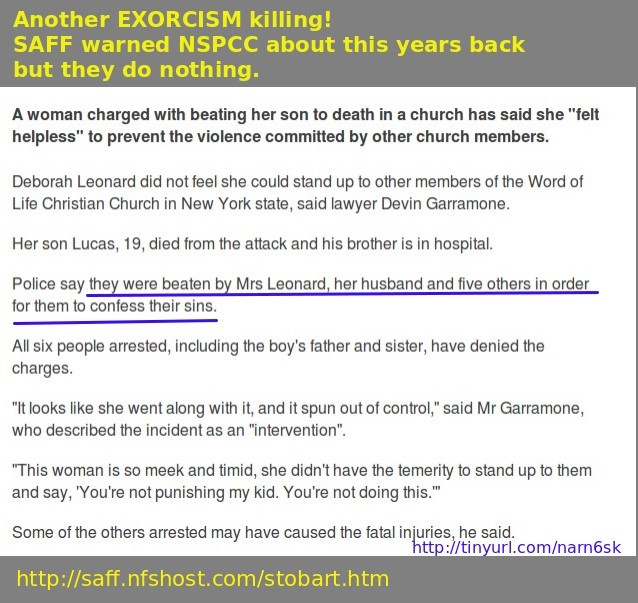 What is it about Neo-Pagan liturgy or
ceremonies which make Berger, Leach and Morrison think it
engenders more suicides than, say, Baptist Christians who
regularly employ harmful exorcisms in their rites and in
some instances actually kill people in those
ceremonies? ( See: http://saff.nfshost.com/stobart.htm
and http://saff.nfshost.com/everyman1.htm
) What is it about Neo-Pagan liturgy or
ceremonies which make Berger, Leach and Morrison think it
engenders more suicides than, say, Baptist Christians who
regularly employ harmful exorcisms in their rites and in
some instances actually kill people in those
ceremonies? ( See: http://saff.nfshost.com/stobart.htm
and http://saff.nfshost.com/everyman1.htm
)
Having been a practicing Neo Pagan for 40 years and being
very well connected in the British occult scene I am
personally aware of several major strains of Paganism
which are:
i Hereditary Paganism,
ii Wicca/Neo Paganism, and
iii Shamanism
The vast majority of Pagans adhere to one or the other of
these.
None of these employ any ceremonies, liturgy or
teachings which could be said to encourage
suicide. So where do Berger Leach and Morrison
think the harm comes from?
Are Berger, Leach and Morrison implying that psychic
development exercises, which may include self-hypnosis,
regression-hypnosis (hypnosis to reach past-lives),
Vitalised Imagination (path-working), Divination,
Trance, Scrying with a crystal and Meditation
techniques are 'dangerous' and can produce depression
which may lead to suicide?
If so then that would also apply to most of the many
thousands of people now undergoing standard psychotherapy
treatment from orthodox medical practitioners who now
use methods very similar to those I've just mentioned,
and I don't see any evidence to suggest that people
being treated by psychotherapists are killing themselves
because of the methods being used to heal them.
Another anomaly in Morrison's article is that she appears
to confuse experienced occultists and Pagans with those
who have just turned up to join Paganism, bringing with
them their existing mental baggage. In her article
she writes;
'Most of us have suffered from feeling like
black sheep; those who come from homes with opposing
faiths, struggle with gender identity or practice
alternate lifestyles are even more likely to
experience this. We tend to be working class people,
whose education often outstrips our financial
circumstances, leading to frustrated ambitions and
debt. We are more likely than the average population
to come from abusive backgrounds and suffer from
neuroses or anxiety disorders. Pagan leaders are
almost guaranteed to encounter someone who looks to
them for guidance that struggles with this illness.
And if you’ve got a diagnosis of a depressive disorder
– at least you know you know you’re not alone! '
But the 1989 Occult Census repudiates that
character profile instantly.
We are not 'all the same' and serious practitioners of the
occult have been proved to be high-achievers and able to
master complex professions precisely because of their
mastering of occult and pagan skills and teachings.
Here in the rightmost column is a socio-economic breakdown
of the 2,000 people who contributed to the 1989 Occult
Census: (nearly half, 42%, of these people declared
themselves to be Pagans)
ALPHABETICAL LIST OF OCCULTISTS'
STATED OCCUPATIONS
ACTOR / SHOWBIZ PERSONALITY
AGENCY WORK / TEMPS
ARMED FORCES
ARTISTS
BANK OFFICERS
BOOK-BINDERS
BOOK-SELLERS
BRICKLAYERS
BRITISH RAIL EMPLOYEES
CAR MECHANICS
CARPENTERS
CHEFS / COOKS
CIVIL SERVANTS
CLAIRVOYANTS (Professional)
CLEANERS
CLERKS
COMPANY DIRECTOR
COMPUTER OPERATOR
COMPUTER PROGRAMER
DEPARTMENT MANAGER
DOCTOR/GP
DRIVING INSTRUCTORS
ECONOMISTS
ELECTRICIANS
ENGINEERS
ESTATE AGENTS
FARMERS
FLORISTS
HAIRDRESSERS
HOMOEOPATHS
HORTICULTURALISTS
HOTELIERS
JEWELERS
LINGUISTS
MANAGEMENT CONSULTANTS
MUSICIANS (professional)
NURSES
PHOTOGRAPHERS
PILOTS / AIR-CREW
PLUMBERS
POLICEMEN
POLITICIANS
POSTAL WORKERS
PRINTERS
PSYCHOLOGISTS
RETIRED
SALESMEN
SCIENTISTS
SELF-EMPLOYED HOUSEWIVES
SOCIAL WORKERS
STUDENTS
TAILORS
TEACHERS
TV TECHNICIANS
TYPISTS / SECRETARIES
UNEMPLOYED
UNSKILLED WORKERS
VAN / LORRY DRIVERS
VETS
WRITERS / JOURNALISTS |
You will see that there are no lost-souls, social
victims, or dabblers in this Alphabetical list . It
is becoming clear that Morrison does not realise the
difference between a Pagan who has been initiated in the
traditional manner, and dabblers or lost-souls who come to
Witchcraft as a last resort.
Clearly such people may have long-standing problems and
see witchcraft as a quick solution. They are
precisely the type of people who would be rejected by a
genuine Coven and redirected to professional help.
Such people should not be accepted into a coven 'to heal
them'. The coven may work healing ceremonies to help
orthodox medicine along but should not interfere with
treatment in any way and such people certainly must not be
exorcised or otherwise ritualised.
Traditionally each applicant for coven membership should
be made to wait 13 moons ('a year and a day') before being
initiated. During that year they will learn the
history of Paganism and study the liturgy of Paganism.
They will be given a long list of source-works to read and
be questioned on their ability to understand them
afterwards. They will be screened for personality faults
and background issues to ensure that their sincerity in
joining the coven is true. They should not be pushed into
doing any mental exercises or ritual work until their
potential has been gauged.
Thus, in Britain at least, vulnerable applicants will be
spotted quickly and gently moved on elsewhere to get
psychiatric help if they need it. This is why there
are no pagan suicides in Britain. Paganism does not
encourage people to commit suicide. Its rituals and
ceremonies teach adherents to be self-reliant and show
them how to come to terms with fears and problems in the
physical world. Paganism makes their life more sensible
not less, and why Morrison thinks otherwise is a
worrying thing.
In the 1989 Occult Census respondents indicated their
opinions on how Paganism and Occultism helped them in
their daily life, here in the panel below is what
they said:
The panel below shows why they thought Occultism helps in
one's Job and chosen Career.
Furthermore the sample also indicated how
Paganism/Occultism could help in society generally so:
Now, just to be sure, we also included a question
about what our 1989 sample thought were the harms that
Paganism and Occultism could possibly cause and the result
was:
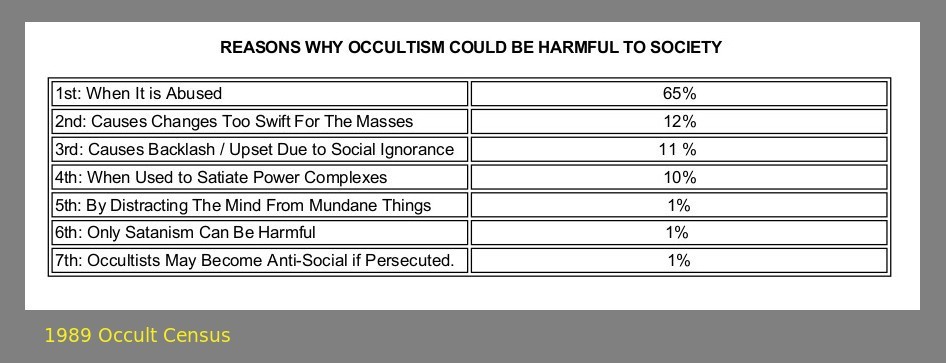
Nowhere did anyone say that Paganism is harmful because
it makes people commit suicide. Why? Because that kind
of thing has never happened.
Dungeons and Dragons: The 36 year
old false allegation that Witchcraft and Paganism
results in people taking their own life.
The insistence that adherents of Paganism will be more
prone to committing suicide is a lie, but this 'guide' by
Morrison is unfortunately not the first time that such
nonsense has been floated. In the US in the
1980s Pat Pulling, a mother whose son committed
suicide, blamed the then newly invented fantasy board game
Dungeons and Dragons for introducing her son to
Witchcraft and Occultism and his resulting suicide.
As this is more or less what Morrison is now claiming
today 36 years later we need to look more closely.
Pulling was a fundamentalist Christian and worked together
with other fundamentalist Christians to ban Dungeons
and Dragons on the basis that it encouraged young
players to kill themselves. She developed a complete
'demonology' of how this happened, none of which had any
basis in fact. In the leftmost column you can see
and read one of her early lectures (1986) and you will see
that it is replete with Pagan connotations and
implications.
Thus it is abundantly clear that Pulling and her
fundamentalist activist mates were attacking Pagans
and Witchcraft by using false claims of suicidal
tendencies in Paganism for sectarian gain.
It is therefore absolutely
horrendous to find Morrison falling in with the
fundies gameplan to disenfranchise Paganism again
today 36 years after Pulling had planted the seed of
this unfact by CONFIRMING in her recent article the
untrue assertion that people in Paganism were
predisposed to commit suicide.
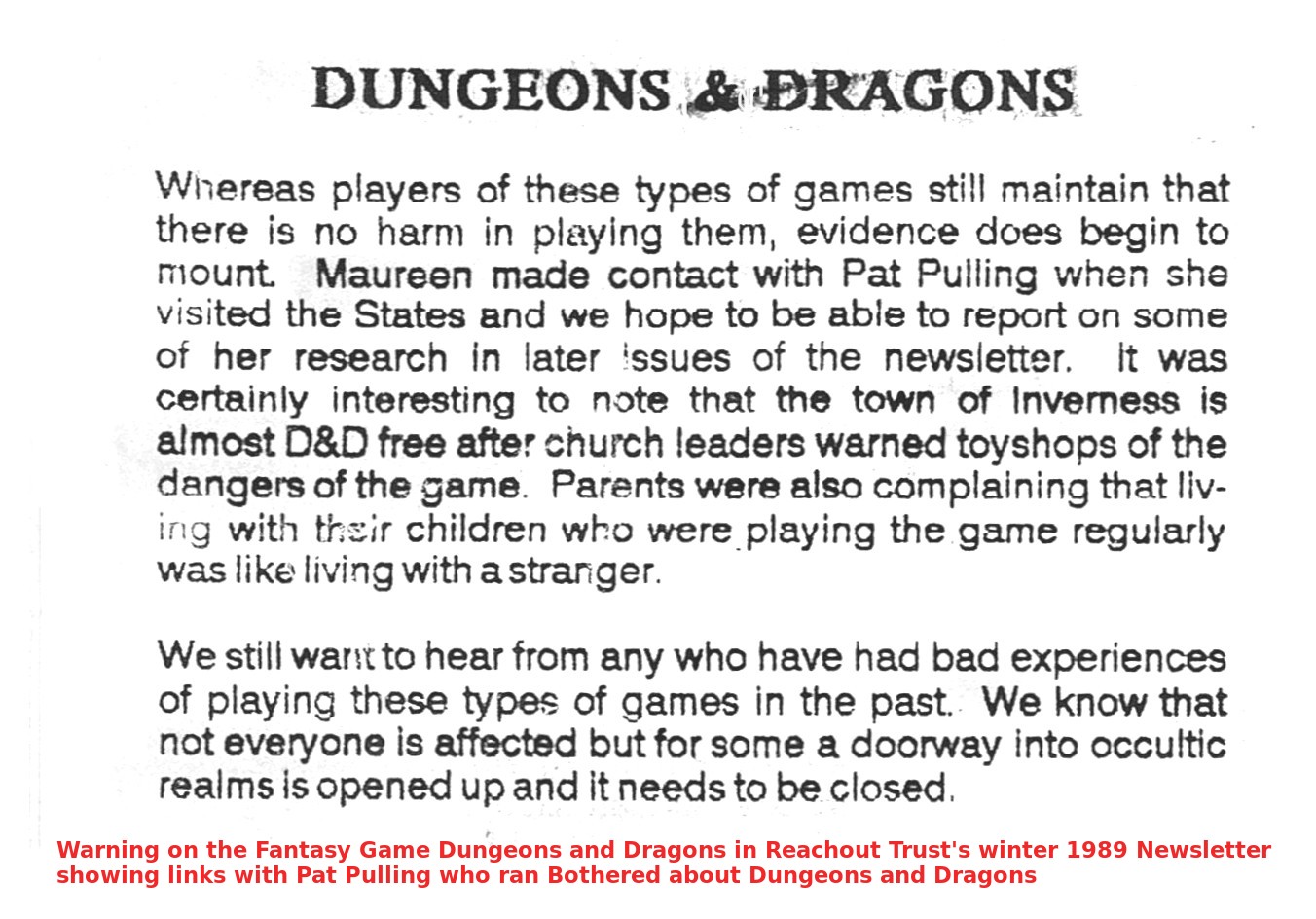 By 1989, at the start of the Satanic Panic
in the UK Pulling was working closely with the English
fundie group; Reachout Trust, which instrumentally
corrupted and manipulated UK public opinion against
Witches and Pagans using age-old lies. You can read just
how influential
Reachout Trust was here: http://saff.nfshost.com/reachout.htm By 1989, at the start of the Satanic Panic
in the UK Pulling was working closely with the English
fundie group; Reachout Trust, which instrumentally
corrupted and manipulated UK public opinion against
Witches and Pagans using age-old lies. You can read just
how influential
Reachout Trust was here: http://saff.nfshost.com/reachout.htm
The illustration, right, is a section from Reachout's
winter 1989 Newsletter, clearly proving a link between
Pulling's claims and further manic untrue allegations of
child-abuse and murder made by Reachout during the same
year.
It took the SAFF years to quash the false idea that Pagan
and Occult beliefs caused people to commit suicide. As the
lecture from Pat Pulling (shown in the leftmost column on
this page) makes clear Dungeons and Dragons was
played by millions of people in the 1980s and 1990s.
Despite Pulling's fundie protestations and claims of
danger there are no more recorded suicides than that of
her son and and Rosemary Loyacan's son, both of which can
be explained away by other causes. It was all a
hysteria which contributed to the 1990 Satanic Panic but
which, like the panic itself, turned out to be utterly
false. However be aware that 1000s, of innocent people
were incarcerated for life based on these lies (see:
http://saff.nfshost.com/usasracases.htm
)
Now literally millions more young kids and adults play
electronic Dungeons and Dragons type games
involving pantheistic characters and if these games really
did cause suicides there would be THOUSANDS upon thousands
of them; but there are none. Here:
https://www.mmobomb.com/games/fantasy you
can choose from a short-list of no less than 195 free
computer fantasy games played right across the world by
young and old without any problem or involvement in
suicide whatsoever.
The original claims by Pat Pulling and others that
occult involvement caused people to commit suicide was a
lie. It is just as much of a
lie to say that anyone studying Paganism today will be
more likely to commit suicide than those who are not
involved in Paganism.
To imply that Paganism has some inherent harmfulness to it
which can exacerbate suicides over and above other
religious beliefs is dangerous rehashed mediaeval hogwash
which trades on the lives of those who were tortured and
went to the stake during the Burning Times. It is an
insult to their memory and an insult to all initiated
Pagans today.
Dianne Morrison and Helen Berger and Evan Leach should
apologise for giving that impression and withdraw the idea
instantly lest it is seized upon by the enemies of freedom
of thought and religion again to use as a hammer to
deprive other free-thinkers of the access to the Ancient
Wisdom which they have benefitted from and obviously do
not appreciate.
John Freedom
Mortlake
Ludi Magni 2022.
|


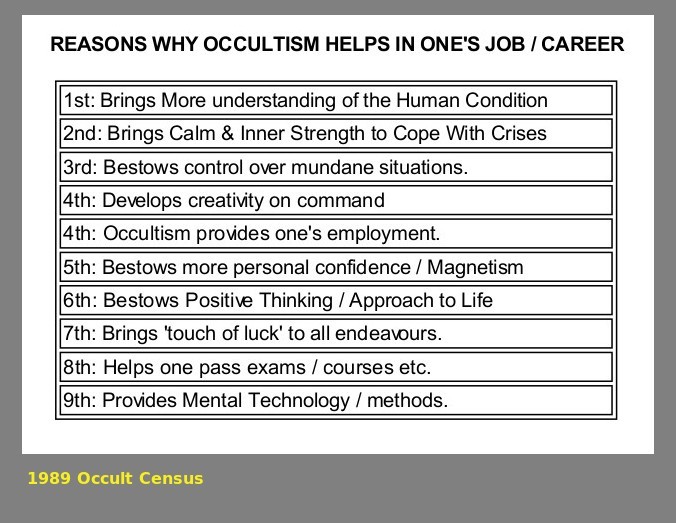

 By 1989, at the start of the Satanic Panic
in the UK Pulling was working closely with the English
fundie group; Reachout Trust, which instrumentally
corrupted and manipulated UK public opinion against
Witches and Pagans using age-old lies. You can read just
how influential
Reachout Trust was here: http://saff.nfshost.com/reachout.htm
By 1989, at the start of the Satanic Panic
in the UK Pulling was working closely with the English
fundie group; Reachout Trust, which instrumentally
corrupted and manipulated UK public opinion against
Witches and Pagans using age-old lies. You can read just
how influential
Reachout Trust was here: http://saff.nfshost.com/reachout.htm